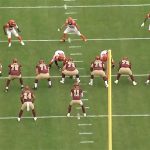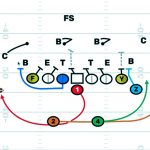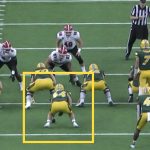Ever found yourself at the top of your golf swing, only to freeze or jerk the club down violently? You might be experiencing the full swing yips, a rare but frustrating phenomenon in the world of golf.
Unlike the more common putting or chipping yips, full swing yips can make it nearly impossible to swing freely at the ball.
These yips often stem from fear, anxiety, and an overwhelming desire to execute the perfect swing. When you’re too focused on perfection, you might find yourself hesitating at the top of your swing or making a sudden, uncontrolled movement.
Understanding this mental block is the first step in overcoming it and reclaiming your confidence on the course.
Understanding Full Swing Yips in Golf
Full swing yips in golf can be incredibly frustrating and perplexing for players. Yips are involuntary muscle spasms or jerks that disrupt a golfer’s ability to execute a smooth, controlled swing. While they’re commonly associated with putting, they can also occur during full swings.
What Are Full Swing Yips?
Full swing yips in golf represent a form of performance anxiety that disrupts your ability to execute a smooth and effective swing. Unlike putting yips, full swing yips are more overt and violent, making them highly noticeable.
These yips often manifest at the top of your backswing, where you might experience an involuntary pause or a sudden, jerky motion when bringing the club down.
Famous athletes like Charles Barkley have publicly struggled with this condition, highlighting how it can affect even the most skilled golfers.
Common Symptoms and Identification
Recognizing the symptoms of full swing yips is crucial for addressing the issue.
Here are common signs that you might be experiencing this problem:
- Involuntary Pauses: You might find yourself freezing at the top of your backswing, unable to complete the motion smoothly.
- Sudden Jerks: A violent, jerky movement often characterizes the downswing, disrupting your timing and control.
- Indecision: Mental hesitation and second-guessing your swing path can lead to physical manifestations of the yips.
- Loss of Confidence: Ongoing struggles with yips can severely dent your confidence, making it harder to perform under pressure.
Causes of Full Swing Yips
Full swing yips, while less common than yips in putting, can still be incredibly disruptive to a golfer’s game.
They can stem from various causes, including:
Psychological Factors
Mental pressure significantly impacts your swing. Anxiety can make you overthink each movement, disrupting your natural rhythm.
When standing over the ball, excessive self-consciousness, especially about others watching, leads to tension and hesitancy.
This unease can transform into a genuine phobia of embarrassment, exacerbating the yips. Fear of failure and a heightened sense of scrutiny create a vicious cycle of performance anxiety and physical tension.
To combat this, focus on building a pre-shot routine that promotes relaxation and confidence. Mindfulness exercises, visualization techniques, and deliberate breathing can help reset your mental state.
By incorporating these strategies, you can reduce anxiety, allowing for a more natural and effective swing.
Physical Triggers
Tension in your muscles impedes fluid motion during your swing. When anxiety increases, muscle tightness follows, creating jerky, uncontrollable movements.
Over-controlling your swing can add to muscle strain, causing your body to lock up and preventing smooth transitions.
Flawed technique or improper grip placement can accentuate these issues. Inconsistent practice routines might also contribute to physical triggers, reducing your muscle memory and leading to erratic swings.
Additionally, psychological factors like fear of failure or overthinking can exacerbate the problem. To combat full swing yips, consider incorporating relaxation techniques, consistent practice drills, and possibly seeking professional instruction to refine your mechanics.
Impact on Game Performance
The full swing yips in golf refer to a rare and debilitating performance affliction that affects a golfer’s ability to execute a full swing.
This condition is characterized by involuntary movements or flinches during the swing, which can manifest in different ways, such as:
Effects on Swing Mechanics
Full swing yips can severely disrupt your swing mechanics. Erratic and inconsistent swings become common, making it difficult to maintain a smooth, repeatable motion.
The transition from backswing to downswing often involves sudden movements or freezing, resulting in mis-hits.
Consequently, your accuracy and distance control suffer, leading to a decrease in overall performance. In severe cases, you might struggle to execute even the simplest shots, impacting your confidence on the course.
The Mental Game Challenges
The mental challenges associated with full swing yips cannot be underestimated. Anxiety, fear of failure, and overthinking can dominate your thoughts, creating a mental block that hinders performance.
Kevin Na, who experienced severe swing yips, found that his ability to focus on balance rather than mechanics allowed him to regain confidence.
The mental strain of dealing with yips leads to self-doubt and frustration, further exacerbating the problem. Overcoming these challenges requires a shift in focus and often the adoption of new techniques or strategies.
Strategies to Overcome Full Swing Yips
To overcome full swing yips, several strategies can be employed:
Mental Training Techniques
Incorporating mental training can significantly reduce full swing yips. Techniques like visualization help you mentally rehearse a successful swing, building confidence.
Mindfulness practices, such as focused breathing exercises, can calm your mind and reduce anxiety during gameplay.
Positive self-talk reinforces a constructive mindset, making it easier to stay composed and execute smooth swings.
Regularly practicing these mental techniques can create a balanced mental state, supporting consistent performance on the golf course.
Practical Tips for Effective Golf Swings
Improving swing mechanics through practical tips can alleviate full swing yips. Focus on maintaining a relaxed grip; tension in your hands often leads to jerky movements.
Ensure a consistent pre-shot routine; consistency breeds familiarity and reduces anxiety. Pay attention to your stance and alignment; a balanced posture promotes smoother swings.
Incorporate drills that emphasize muscle memory, such as practicing half-swings to enhance control. Gradual improvements in technique can lead to reduced occurrences of yips during full swings.
Professional Guidance and Support
Seeking professional guidance offers valuable insights into overcoming full swing yips. Engaging with a golf coach, who can provide personalized feedback, helps you identify and correct flawed mechanics.
A sports psychologist can assist in addressing the psychological aspect, offering strategies to manage anxiety and improve mental resilience.
Participating in support groups with fellow golfers facing similar issues fosters a sense of community and shared learning.
Professional support equips you with tailored strategies, enhancing both mental and physical aspects of your game.
Prevention and Long-Term Management
Prevention and long-term management of full swing yips involve a combination of strategies that address both the physical and mental aspects of the condition.
Here are some key approaches:
Routine Development
Establishing a consistent routine is essential in managing full swing yips. Start by developing a pre-shot routine that you follow before every swing.
This consistency helps create a sense of familiarity and reduces anxiety over time. Your routine might include visualizing the shot, deep breathing, and a few practice swings.
Daily practice routines can also reinforce muscle memory and improve confidence. Allocate time for focused practice on the driving range, concentrating on specific aspects of your swing.
Consistency in practice builds a reliable foundation, making it easier to handle high-pressure situations on the course.
Incorporate physical conditioning into your routine. Regular exercises such as stretching, strength training, and cardiovascular workouts improve overall fitness, contributing to better swing mechanics and reducing the risk of muscle tension, a known trigger for the yips.
Stress Management in Golf
Effective stress management is crucial for preventing the full swing yips. Incorporate relaxation techniques into your routine, like deep breathing exercises, progressive muscle relaxation, or meditation. These practices help lower stress levels, allowing you to approach each shot with a calm, focused mind.
It’s important to set realistic expectations for your game. Understand that mistakes are a part of golf and that perfection isn’t attainable. By accepting this, you reduce the pressure you place on yourself, effectively minimizing performance anxiety.
Seek support from mental health professionals or sports psychologists if stress becomes overwhelming.
They can provide personalized strategies to manage anxiety and fear related to your performance, enabling you to play golf with more confidence and enjoyment.
Frequently Asked Questions
How can full swing yips be prevented in the long term?
Developing consistent routines, engaging in daily practice, maintaining physical conditioning, managing stress, and setting realistic expectations are key to preventing full swing yips over the long term.
Can physical conditioning help with full swing yips?
Yes, regular physical conditioning can reduce muscle tightness and improve overall golf technique, helping prevent and manage full swing yips.
When should a golfer seek support from a mental health professional?
Golfers should seek support from a mental health professional or sports psychologist when stress and anxiety become overwhelming, impacting their performance and enjoyment of the game.
Is it possible to completely overcome full swing yips?
While challenging, it is possible to overcome full swing yips with the right mental and physical strategies, personalized coaching, and consistent practice routines.
Conclusion
Full swing yips can be a daunting challenge for any golfer but with the right approach you can overcome them. By understanding the psychological and physical triggers you can start addressing the root causes.
Implementing mental training techniques, refining your swing mechanics, and seeking professional help are crucial steps in this journey.
Remember that prevention and long-term management are just as important as overcoming the yips. Developing a consistent routine, practicing regularly, and managing stress effectively can make a significant difference.
Don’t hesitate to reach out for support when needed. With patience and persistence you’ll find yourself back on the fairway with confidence.








Colin McCarthy